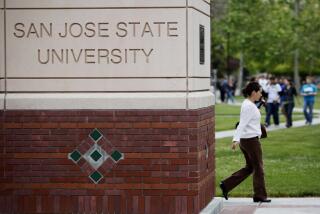Op-Ed: Professors are overwhelmingly liberal. Do universities need to change hiring practices?
As graduation tents go up on campuses around the country, some are claiming that the tent of American higher education is not big enough. Citing an apparent shortage of conservative professors, critics charge that universities look nothing like the rest of the country, and they urge reform of hiring practices to correct for political imbalance. Though this proposal merits consideration, it rests on two basic misunderstandings.
Do liberals predominate on faculties? They do. Back in 2006, sociologist Solon Simmons and I conducted a national survey of professors’ politics. Advocates of reform such as psychologist Jonathan Haidt, political scientists Jon Shields and Joshua Dunn, and New York Times columnist Nicholas Kristof have used our findings to characterize college campuses as bastions of progressivism.
At the time of our study, a fifth of all American adults described themselves as liberal. Simmons and I found that about half of the faculty did. Even among professors who chose the label moderate, liberal political opinions were quite common, especially on social issues such as gender equality and gay rights. Only 14% of professors in our survey identified as Republican. Academia isn’t teeming with radicals, but it is one of the most liberal occupations in the U.S.
How can students be well educated when they only hear one side of the argument?
Critics say the end result is that liberal political opinions now drown out other viewpoints in the classroom. How can students be well educated when they only hear one side of the argument? As a solution, they advocate hiring more conservative professors, perhaps through some form of affirmative action.
Colleges and universities should expose students to a diverse array of ideas. But — here’s the first misunderstanding — just because most professors are liberal doesn’t mean the average student is being force-fed liberal ideology.
In interviews I conducted with professors, I found that a large number teach on highly technical subjects where it would be downright weird to let politics enter the classroom. As one engineering professor put it when asked how politics factored into his work, “a chunk of metal doesn’t have politics.”
In the social sciences and humanities, where political views are more relevant, I found very few academics whose stated goal was to sway students to their side of the political aisle. The vast majority of professors focus on teaching students the subject matter of their fields as well as basic skills such as analytical reading, writing and critical thinking. If current events do come up in classroom discussions, the usual pattern is for professors to promote what they see as open conversation.
Surveys of students suggest these efforts are generally successful. A recent Harvard study, for example, found that 21% of Republican students nationwide — as compared to 8% of Democrats — say they do not feel comfortable sharing their political opinions on campus. In an ideal world, both numbers would be zero, but if suppression of conservative voices were rampant we’d see a far larger share of collegiate Republicans concerned about their freedom of speech.
The second misunderstanding among reformers is the cause of the political imbalance in academia. One common explanation is that liberal professors are “intolerant” of those who disagree with them and discriminate against conservative scholars who want academic jobs.
It’s true that many academic liberals have negative feelings about conservatism and the GOP. The country is polarized and passions are running high. But even if professors on hiring committees were out to employ political buddies rather than stellar researchers and teachers (which they aren’t), they would find there are few conservative scholars to discriminate against.
That’s because if you look at the politics of graduate students, they mirror the politics of the professoriate. Liberals vastly outnumber conservatives in the graduate student ranks, and it’s graduate students and recent PhD recipients who apply for most academic jobs. That means that if a robot with no political bias whatsoever was hiring professors at random, you’d still wind up with a highly liberal professoriate.
But why aren’t more conservatives going to graduate school? Could it be because political correctness has gotten out of hand on campuses, dampening their interest? That hypothesis is undercut by studies showing that the graduate student pool has been liberal for at least half a century, long before political correctness was a thing.
The theory I and some others have advanced is that academia acquired a reputation for hospitality to progressive values early in the 20th century. Because of that reputation, smart young students on the left have tended to see higher education as a possible career option. They’ve entered the academy in larger numbers — in a process that reinforces its reputation for liberalism. When critics falsely allege liberal intolerance, they feed into that same reputation, scaring young conservatives away from academic jobs.
In a period of rising global competition, American higher education needs the very best talent it can get. Our single-minded focus should be on hiring professors who will be leaders in their fields and superlative instructors. As a rule, politics should play no role at all in academic employment decisions; we should neither keep conservatives out nor fast-track their entry into the academic fold.
Neil Gross is a professor of sociology at Colby College and the author of “Why Are Professors Liberal and Why Do Conservatives Care?”
Follow the Opinion section on Twitter @latimesopinionand Facebook
More to Read
A cure for the common opinion
Get thought-provoking perspectives with our weekly newsletter.
You may occasionally receive promotional content from the Los Angeles Times.










